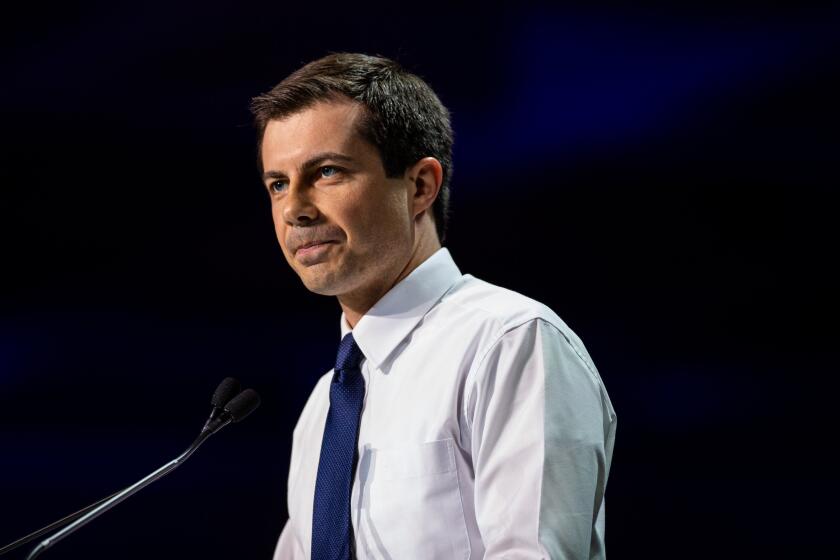The third Democratic presidential debate is in the books, as the 10 qualifying candidates sparred over healthcare, immigration and foreign policy.
The nearly three-hour debate was alternately fierce and friendly, with a heavy sprinkling of pre-planned zingers in the mix. Did tonight’s showdown in Houston fundamentally alter the dynamics of the primary? Read real-time analysis from our political reporters below.
Commentary from national political reporters Melanie Mason, Noah Bierman, Tyrone Beason, Seema Mehta and Matt Pearce, Washington bureau chief David Lauter and columnist Doyle McManus.
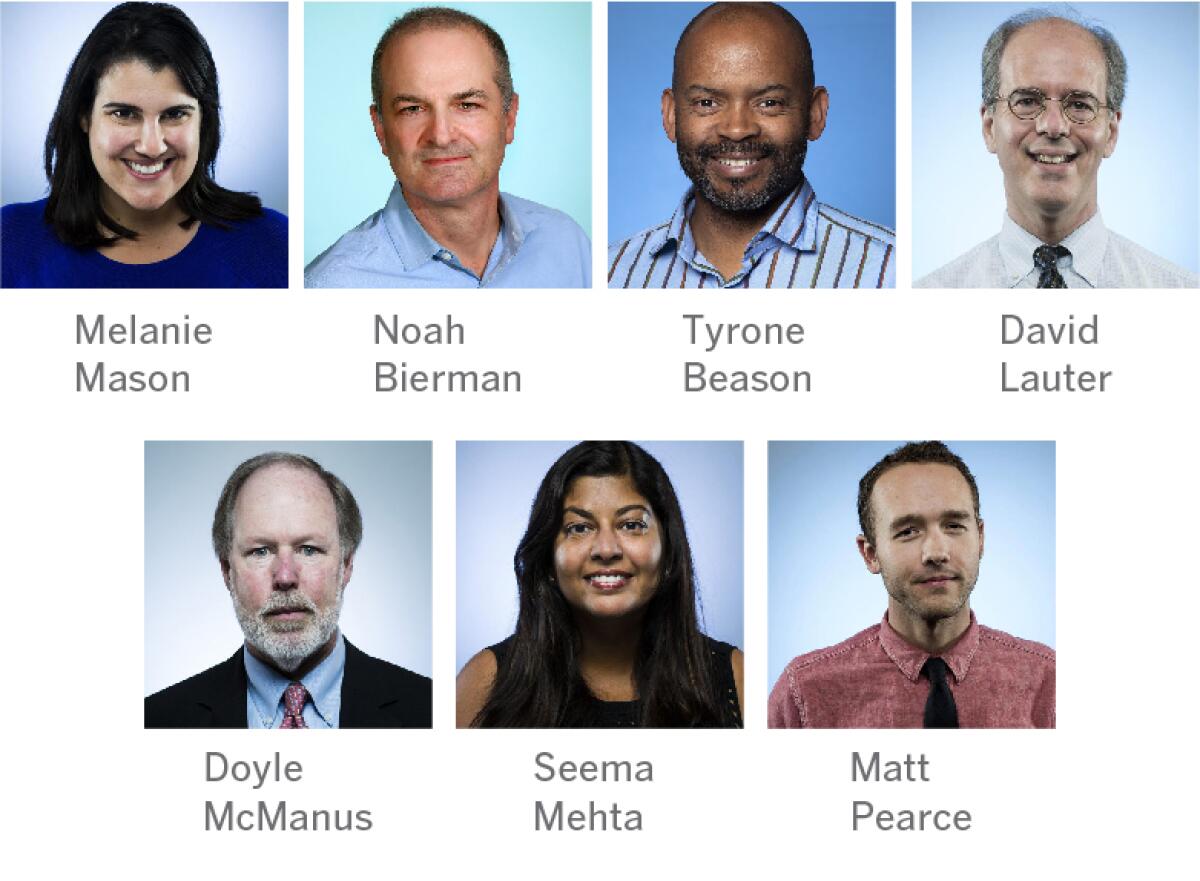
- Share via
After three hours and 10 candidates, did anything in this race change?
QUESTION: That’s a wrap on the debate. Esteemed colleagues, what stood out to you? Did anything happen to change the dynamic of this primary race? – Melanie Mason
Seema Mehta: I don’t think we had a Rick Perry forgetting-which-federal-departments-he-planned-to-close kind of moment. But there were a lot of interesting exchanges.
Matt Pearce: Beto O’Rourke probably had his strongest debate of the campaign. Came up with a clear message and reason for being on stage, given the recent shootings in Texas. But at least so far this year, effective debate performances have not dramatically changed the polls.
Seema Mehta: Joe Biden entered the night pretty passionate and resolute, but he did bristle when questioned about his embrace of Obama’s legacy. And I think I know what he meant when he started talking about record players, but that clip is surely going to end up on the late-night shows.
Tyrone Beason: There were some good and revealing exchanges but for voters looking for less sniping among the candidates, they probably didn’t get what they wanted tonight.
Doyle McManus: That’s the central question: Did anything change the overall dynamic? My answer is no. Joe Biden started strong, meandered and stumbled later, but hey, that’s Joe Biden. Elizabeth Warren had a good night, and may continue winning new supporters. Bernie Sanders reinforced the Bernie Sanders brand. Kamala Harris, Cory Booker, Amy Klobuchar, Pete Buttigieg and Julian Castro all had moments — but none of them presented a compelling reason for Biden, Warren or Sanders voters to come over to their side.
Seema Mehta: That’s a good point — Biden has had a number of gaffes or unusual statements on the campaign trail and he still remains the front-runner in the race.
Noah Bierman: It felt like a status quo debate, which was good for Warren, who is steadily rising, and Biden, who is trying to hold his ground. The early exchanges on healthcare offered the most revealing information for voters trying to make a choice about the party’s direction. That’s been constant through the campaign.
Tyrone Beason: Biden’s passion was clearly evident throughout but his answers on race in particular seemed to spill all over the place. The thing about record players? Not sure where that thought was supposed to go, or what Venezuela had to do with the question he was asked.
Seema Mehta: Going into the debate I think a lot of people were wondering what kind of performance Kamala Harris would turn in — a star move like the first Democratic debate in June, or more wobbly, like her answers in the July clash. Seems like the answer is neither — she held her ground and didn’t make any big mistakes but she didn’t do anything that remotely compares to her performance in June. She also really tried to stay focused on criticizing President Trump.
Matt Pearce: For all the friction over the lack of a Democratic debate on climate, we heard very little about the candidates’ actual policies in this three-hour round. We’re talking about plans that would transform the entire economy like something on the scale of a mobilization for a world war. The end of the coal and oil and gas industries. And the first question was about Booker’s veganism.
David Lauter: Remember that we watched all 3 hours. Most people won’t. If the clip you see tomorrow is Biden talking about getting back up off the mat after his wife was killed, you’ll have a very different view of the debate and him than if you see Biden and the record player. I do think that Booker made a strong case for himself. But he’s done that before with very little evidence to date that voters are responding.
Seema Mehta: I felt Booker had a similarly strong performance in the July debate in Detroit, and that didn’t seem to lead to any additional support in the polls.
David Lauter: Warren once again did a good job of presenting her case. But I’m not sure she did anything to solve the big problem she faces — a lack of support from voters who aren’t college-educated, white liberals.
Matt Pearce: What we did NOT see from Warren tonight, notably, were attacks on Biden’s record on economic and financial policy.
Melanie Mason: I think the candidates largely got the memo from Democratic primary voters that they didn’t want the candidates to beat up on each other too hard (with some key exceptions, like Castro going after Biden).
Now, will someone tell the contenders that pre-planned zingers almost never land well? There were a lot of canned jokes in this debate, and I only laughed at one. (Booker’s joke about saying “no” in Spanish earned a genuine chortle from me.) And with that, it’s time to call it a night.
Thanks for reading!
- Share via
7 takeaways from the Democratic debate in Houston
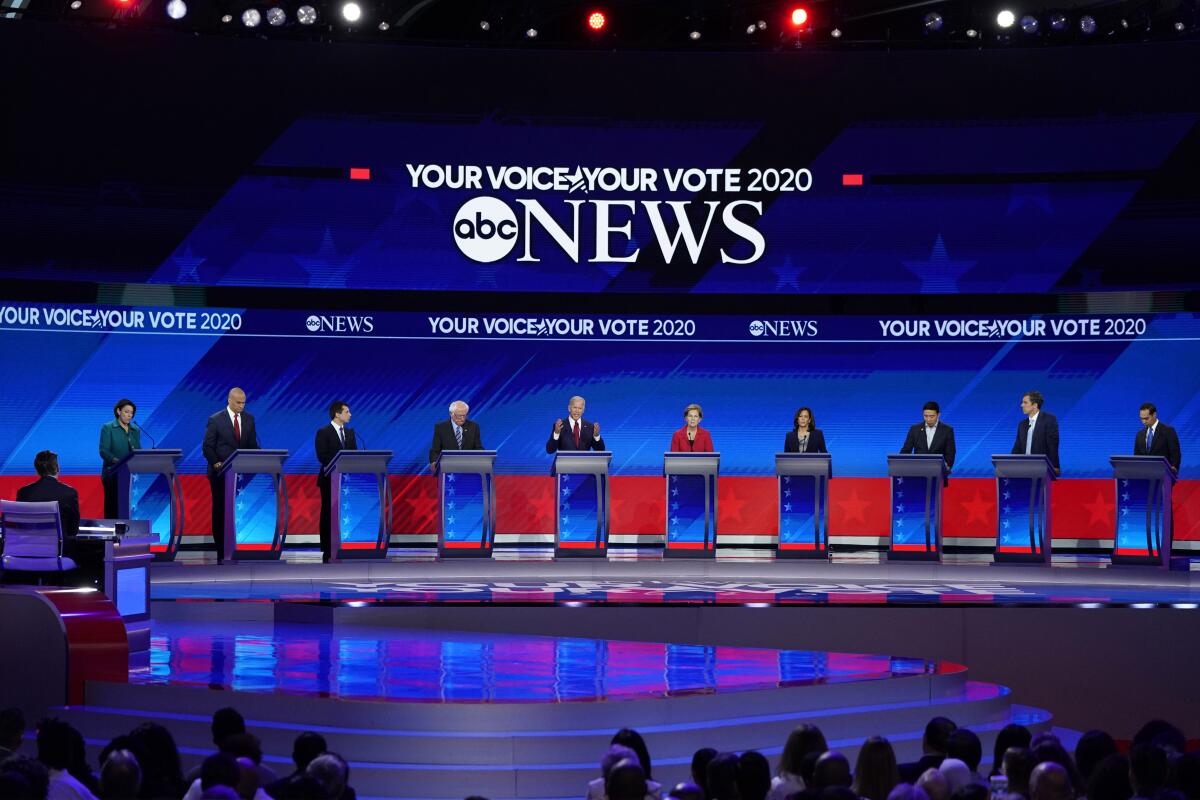
Still sitting there, battered and benumbed?
Take 10 presidential candidates, put them on a stage for nearly three hours and what you get is an onslaught of verbiage that taxed even the most stoic political devotee.
None of the two prior rounds, in June and July, did much to shake the fundamentals of the Democratic race, and it remains to be seen whether Thursday’s marathon session changes that equilibrium. It doesn’t seem likely.
Until that’s clear, here are seven takeaways from the long night’s journey in Houston.
- Share via
How did the candidates sell themselves for the presidency?
QUESTION: Last question! And it’s on professional setbacks, a standard job interview query. What do we think of how these candidates are using this question to sell themselves for the job? — Melanie Mason
Matt Pearce: Seems very much like a “who would you rather have a beer with” question.
Seema Mehta: Seems like it gives them an opportunity to tell parts of their bio to voters who might not have heard them yet.
David Lauter: Biden and Warren are both using the question to reprise the key points of their biographies that they’ve emphasized in speeches for years, but which a lot of voters may not have heard yet.
Matt Pearce: Kind of a tepid response from the audience to Warren, who normally kills it on her stump speech, which is very heavy on her biography. Not sure what that says about her delivery, however, given that it’s getting late and the audience has been sitting through this for 2 ½ hours now.
Seema Mehta: How great would it be if they talked about truly controversial parts of their bios, like Biden’s plagiarism scandal or Sanders’ controversial writings in college.
Matt Pearce: I’m thinking of that tarty old George Orwell line, Seema: “Autobiography is only to be trusted when it reveals something disgraceful.”
Doyle McManus: Ah, but in a campaign, autobiography is always a tool to make the candidate sound more admirable — even when it’s true.
Matt Pearce: Not hearing much setback in these responses. Cory Booker’s is about how the flattering documentary about him as Newark’s mayor didn’t win the Oscar.
Noah Bierman: Cory Booker is actually being funny at least, talking about how the documentary lost the Oscar to “March of the Penguins.”
Seema Mehta: I think that was the second time tonight he used the word “dagnab” or “dagnabbit.”
David Lauter: One of Biden’s strengths as a politician has always been that he really has dealt with tragedy in his life, and people identify with that. I’m not sure that Yang’s account of failing in his first business venture or Booker having a documentary made about his first electoral defeat quite hits that mark.
Noah Bierman: This is the point in the evening where remaining viewers may be tempted to check in on the football game (Panthers 12-10 in the third).
- Share via
How are the candidates doing on addressing education?
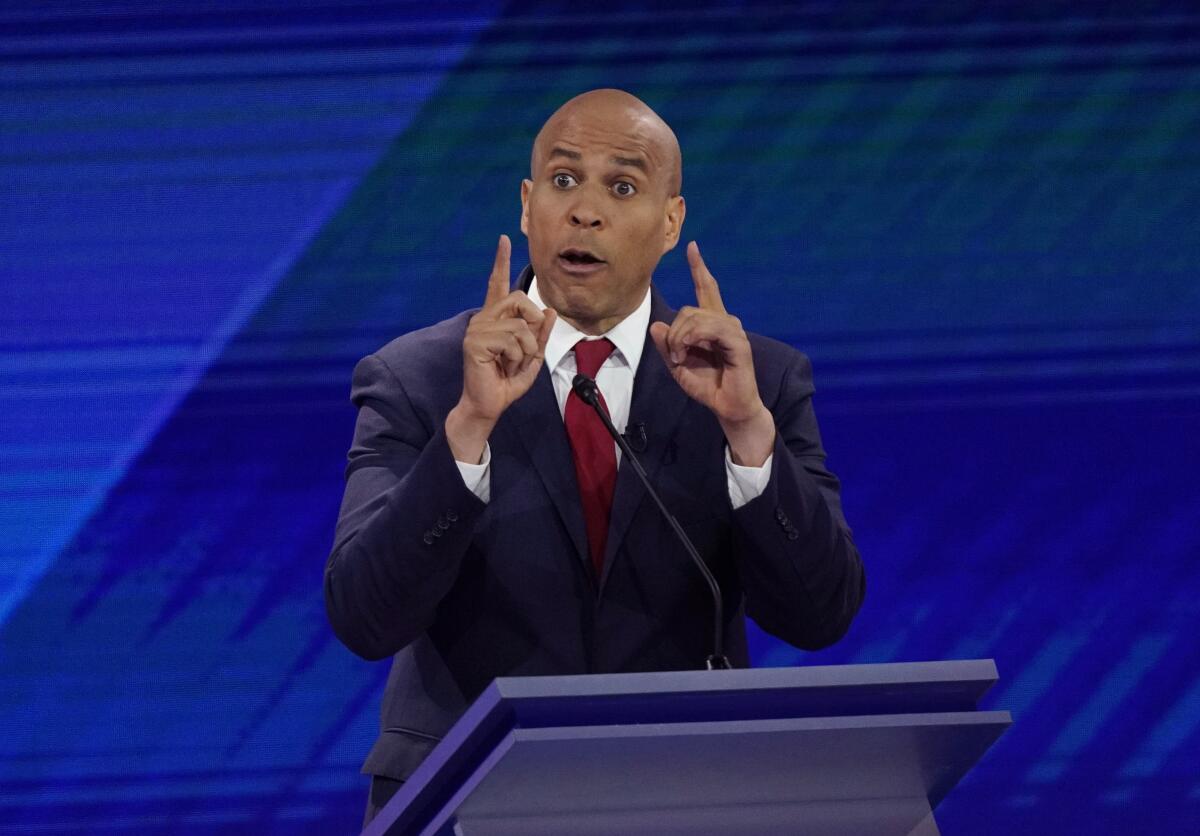
QUESTION: What do we think about this education portion of the debate? Are the candidates doing much to differentiate themselves on K-12 education? — Melanie Mason
David Lauter: They all, so far, seem to be competing to pledge to raise teacher pay. There is a significant difference among the candidates in their position about charter schools, but the moderators largely let that one slide.
Seema Mehta: That question about charter schools had the potential to — but then didn’t. Booker also has a history of promoting charter schools, and being aligned with groups that have ties to Betsy DeVos, Trump’s education secretary.
Doyle McManus: Warren showed how good a campaigner she is. She said, “This is about values,” and noted that she’s the only former public school teacher on the stage. Easy to see how she’s risen to the top tier.
- Share via
Climate change has its moment ... thanks to Jay Inslee?
QUESTION: Two hours into this debate, climate change finally comes up. On the campaign trail, the Democratic candidates have been trying to one-up each other with ambitious climate plans. How are they doing in talking about their policies tonight? – Melanie Mason
Matt Pearce: Jorge Ramos’ first question about climate was to Cory Booker, about whether Americans should share his veganism. Booker said no. But that’s the kind of question that will make many climate activists groan, because it frames the issue around individual choice rather than policy. Activists see policy, not choice, as the path to most effectively cut carbon emissions.
Noah Bierman: Matt, he could have asked him about soda straws!
Seema Mehta: I was wondering which candidate would be the first to name-check Jay Inslee, whose brief presidential campaign was centered around his calls to combat climate change. Elizabeth Warren was the first to mention the Washington governor.
Matt Pearce: Inslee is perhaps the only candidate thus far to drop out of the race with a much stronger standing inside the party than when he started.
Andrew Yang has had some offbeat responses to climate change in the Democratic debates by shifting to his universal basic income proposals. In the last round, he said that UBI would empower Americans to have more financial power to respond to climate disasters.
Tonight, he pivoted to campaign finance reform, saying that one of his UBI policies for campaign contributions would help Americans offset oil companies’ political cash.
Doyle McManus: That was a question where the moderators missed a chance to illuminate differences. Do all the candidates favor a carbon tax? Do they all want to ban fracking? We don’t know, because they weren’t asked.
- Share via
Does Biden’s long history in the Senate get in his way when it comes to foreign policy?
QUESTION: Candidates are now being asked about their plans for Afghanistan, marking some of the most extended attention to foreign policy we’ve seen in this campaign so far. Who benefits from the focus on this topic? – Melanie Mason
Seema Mehta: Biden. The former vice president has extensive foreign policy experience, from his decades in the Senate as well as his time as vice president. There hasn’t been much substantive foreign policy discussion in this campaign, and he clearly views this as a strength. But he also has a problem – his vote for the Iraq war in 2002.
David Lauter: I’m not sure who benefits politically, but Warren just made a very unequivocal pledge to withdraw troops whether or not the U.S. has a peace agreement with the Taliban. “The problems in Afghanistan are not problems that can be solved by a military,” she said.
Seema Mehta: Biden certainly wasn’t alone among Democrats in voting for the war. However, we saw how Hillary Clinton’s vote for the Iraq war came back to haunt her in 2008. Obama used that vote to draw one of his biggest contrasts with Clinton, his chief rival for the nomination. Seems like Biden is trying to preempt an attack on that Iraq war vote.
David Lauter: Biden made a pledge that was also pretty unequivocal about Afghanistan: “We don’t need those troops there. I would bring them home.”
Melanie Mason: Biden has more foreign policy experience than many on the stage, but that means he has more of a record he had to explain. His answer on his Iraq vote was a bit meandering.
Seema Mehta: And Sen. Sanders used it to draw a clear contrast with Biden, saying that one of the key differences between them was “I never believed what Cheney and Bush said about Iraq.”
Doyle McManus: An example of how Biden’s long history gets in his way: He tried to explain his vote in favor of the Iraq war, his support for troop withdrawal in 2011, and his position on Afghanistan – all in one hard-to-follow answer.
- Share via
How are the candidates talking about foreign policy in a way that’s understandable to viewers?
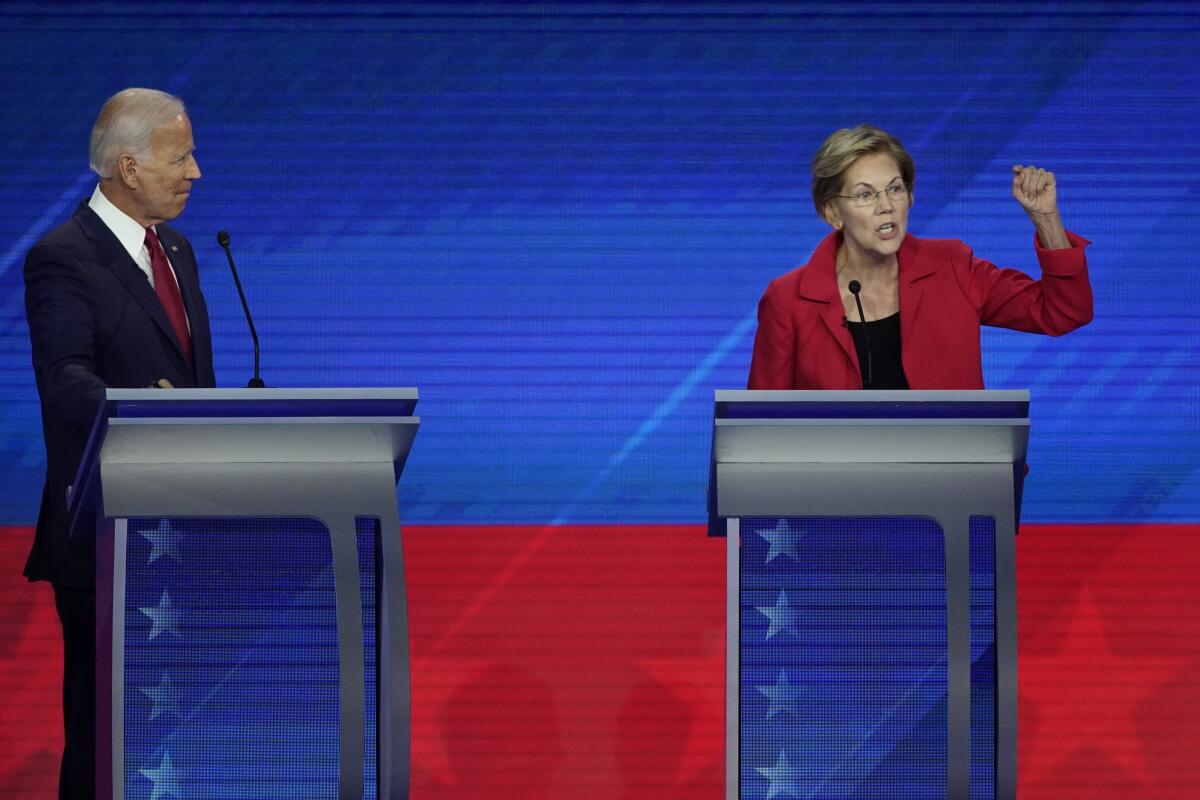
QUESTION: Foreign policy tends to get short shrift in presidential debates, but now candidates are asked to discuss Trump’s tariffs and trade war against China. How are they doing in talking about foreign policy in a way that’s understandable to viewers? – Melanie Mason
David Lauter: The candidates are quickly pivoting to talk about Trump’s shortcomings as a deal maker, rather than getting into the weeds of trade policy. (And they’re also making a point of mentioning Iowa farmers.)
Noah Bierman: And they are not saying they would drop the tariffs, which Trump would seize as a point of weakness. Instead, they are painting Trump’s style as disjointed and unsuccessful, an easier target. If they pin themselves to dropping the tariffs, they would leave the country in a tough negotiating position.
Doyle McManus: This is an illustration of how Trump has been the great unifier of the Democratic Party. Trade was (and still is) a divisive issue among Democrats – except they all think Trump’s approach is feckless and wrong.
Noah Bierman: Warren actually agrees with Trump on opposing Obama’s proposed trans-Pacific trade deal. But she paints her opposition in terms she favors, including arguing that the deal would be a boon to multinational corporations and harmful to American workers.
Doyle McManus: Biden, on the other hand, lobbied for Obama’s Pacific trade deal. He now supports rejoining it, but with changes. Let’s see if he owns up to that position.
David Lauter: “I am not a protectionist Democrat,” says Harris, which is about as close as any of tonight’s candidates have come to the sort of pro-trade position taken by both Obama and Clinton (Bill and Hillary).
Noah Bierman: Remember that Trump gave Hillary Clinton fits on this issue in 2016. Before running, she had argued hard for the proposed Trans Pacific Partnership deal, but she pivoted against it during the election. She adopted Biden’s position then, saying it needed improvements. Trump argued that she would make small changes and sign it quickly.
- Share via
What have been the major moments so far in this debate?
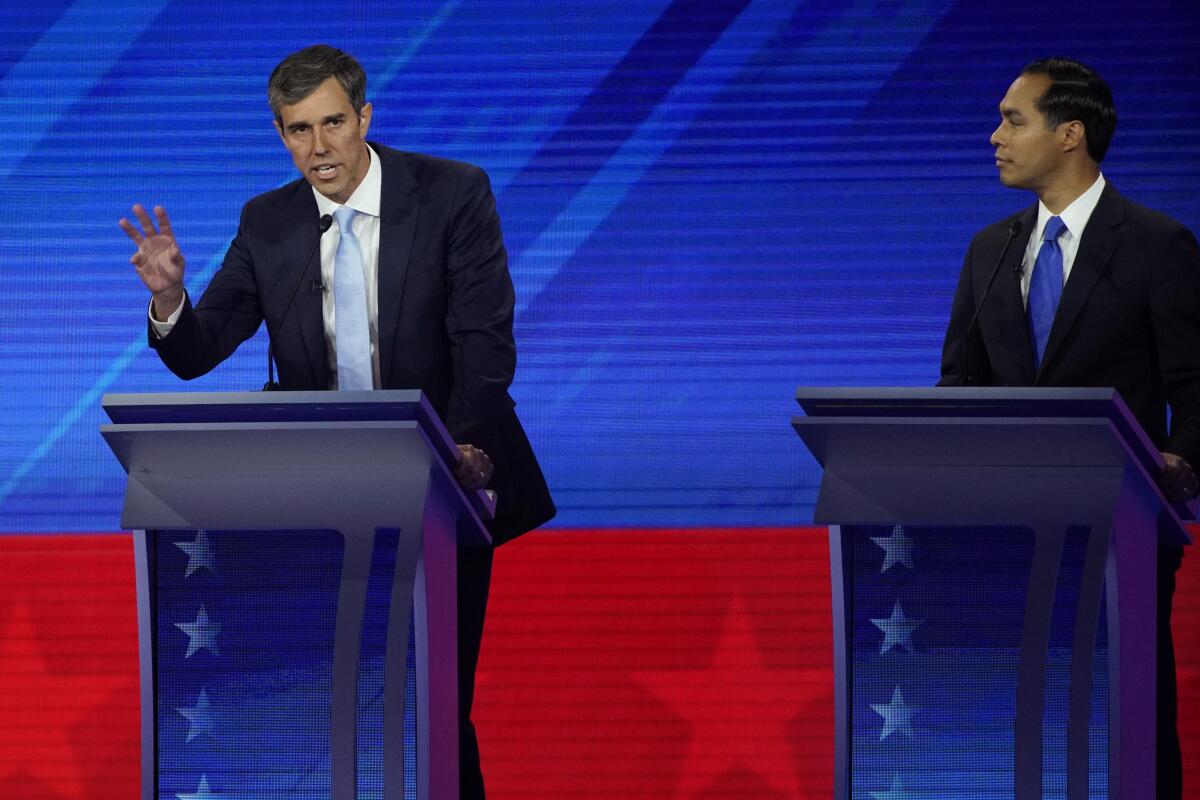
QUESTION: I’ve never been so happy to see a commercial, and I’m sure the candidates feel the same way. As we take a halftime pause, what do you guys think have been the major moments so far? — Melanie Mason
Matt Pearce: Beto O’Rourke is going to get notice for his big applause line on assault-rifle buybacks: “Hell yes, we’re going to take your AR-15, your AK-47.”
Noah Bierman: Biden getting called out for Obama’s record of high deportations looks like it could stick. Castro closed out the discussion by pointing out that Biden is more than happy to take credit for Obama’s other accomplishments but has tried to step aside on deportations. Matt, I think O’Rourke’s line on taking away guns will also get big notice from Republicans, as will Warren committing herself more forcefully to Medicare for all.
Melanie Mason: I personally am really struck by how assertive Castro has been -- going after Biden’s memory in the healthcare portion, and then that jab on immigration that you referenced, Noah. He had a minor breakout moment in the first debate when he sparred with Beto, and clearly he’s trying to recapture the buzz.
- Share via
How do candidates debate immigration in the age of Trump?
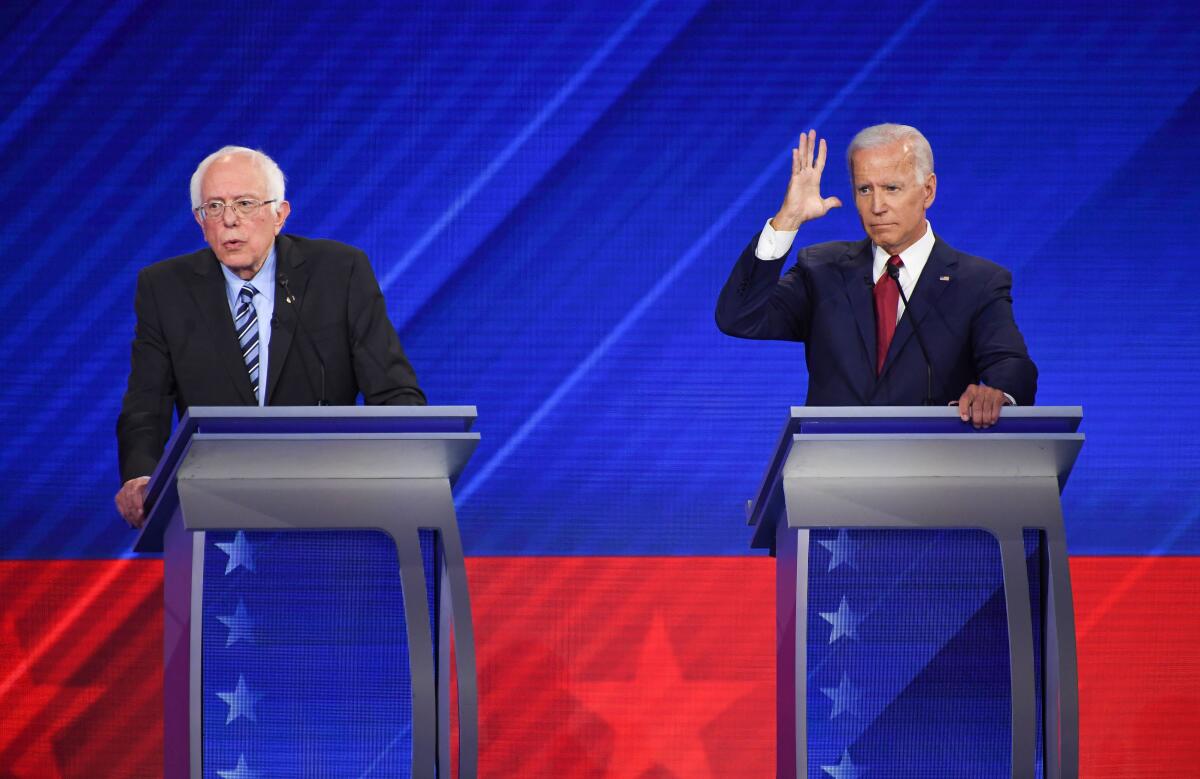
QUESTION: Immigration is now the topic and Biden is asked to defend the Obama administration’s record on deportations. How do you all think Trump’s presidency has changed the immigration debate? — Melanie Mason
Doyle McManus: Democrats like Barack Obama and Joe Biden once tried to find common ground with Republicans on immigration. Now the common ground has disappeared. And that leaves Biden stranded on an iceberg when moderator Jorge Ramos asks if Obama erred by escalating deportations: “The president did the best thing that could be done at the time.... I stand with Barack Obama, all eight years.”
David Lauter: The Democrats have become far more immigrant-friendly — and skeptical of immigration enforcement — because of Trump. And polls indicate that public opinion, in general, has moved in favor of increased immigration and a potential path to citizenship for those here without authorization. But the Democrats all face a problem: Voters overall believe the United States has a right to control its borders, which requires some form of enforcement system.
Noah Bierman: David, Andrew Yang just put an exclamation point on your observation. He called himself the opposite of Donald Trump, inviting immigrants into the country so their children can run for president rather than building a wall.
David Lauter: That sort of inclusive, welcoming message is pretty popular with voters — until Trump, it was pretty much a bipartisan part of the American creed. What’s a lot harder for Democrats is acknowledging that there are some people who, as president, they would be willing to deport. They know that’s a reality, but they don’t really want to talk about it.
- Share via
What can we learn from how the candidates are responding to gun control?
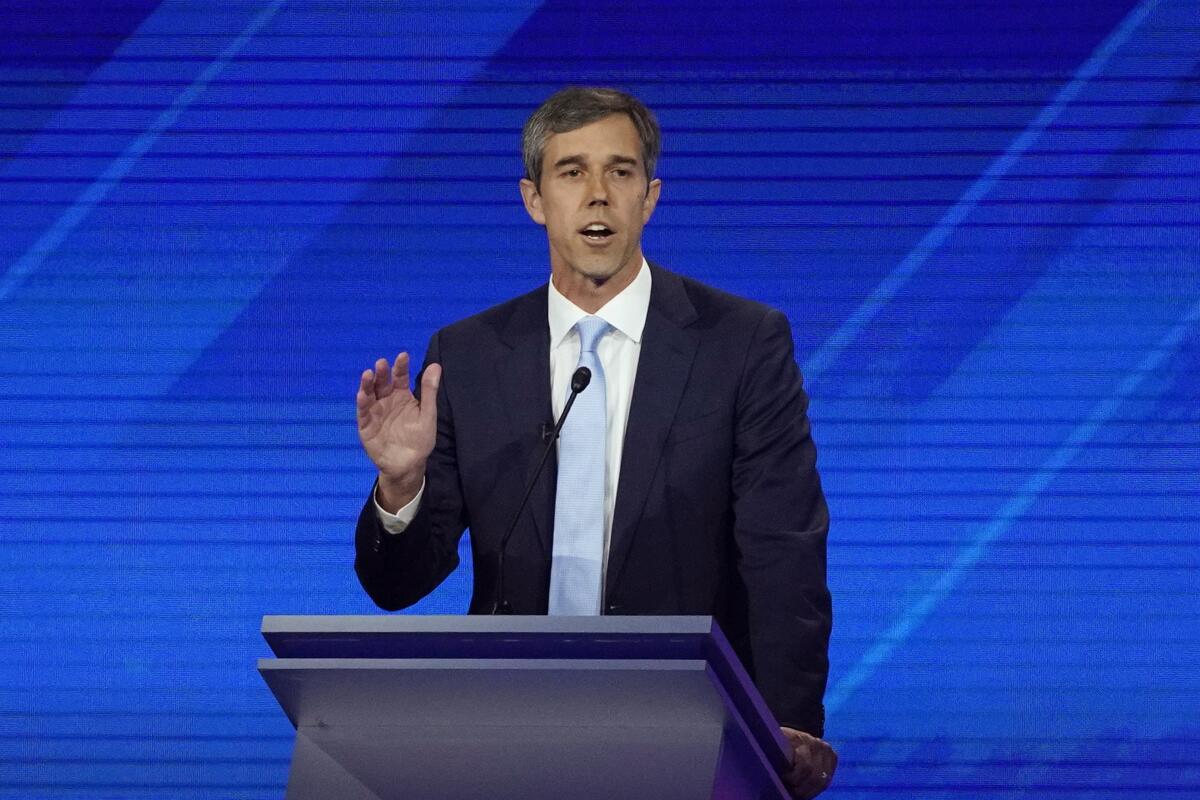
QUESTION: It wasn’t that long ago that gun control was an issue that Democrats shied away from. “Things have changed,” Biden just said, and certainly the politics of gun control have changed. What are we learning from how the candidates are responding to the issue? — David Lauter
Noah Bierman: Sen. Kamala Harris is making an emotional case to change gun laws by executive action. It may be good politics, but former Vice President Biden is correct when he points out that it’s very difficult to make such major change in the law without Congress. It’s a classic in presidential debates. Candidates say issue X is so important that they cannot depend on Congress. But as Trump, Obama and most other presidents have found, Congress is required to pass a law. And as the next president can overturn an executive action.
David Lauter: Former Rep. Beto O’Rourke is certainly the first serious presidential candidate who has said in a televised debate that “Hell, yes, we’re going to take your AR-15,” a military-style rifle. And that’s the biggest applause line of the night.
Noah Bierman: That will be an interesting clip if O’Rourke decides to run for Senate in Texas again, which is perceived as a pretty pro-gun state.
Melanie Mason: Reminder — ABC executives asked the candidates not to use salty language, given that Beto’s been swearing up a storm lately. “Hell yes” is probably kosher for broadcast, though.
Noah Bierman: Sen. Amy Klobuchar finds a way to moderate every position by a few degrees. On guns, she said Congress should start with a buy-back program. It’s an interesting philosophy, tweaking each of the liberal ideas, but tough politics in a primary.
David Lauter: Even a voluntary buy-back goes far beyond what the Obama administration even considered proposing after the Sandy Hook school massacre. If that’s the moderate Democratic position now, it does show how quickly the politics of the issue have shifted.
Noah Bierman: Sen. Booker shows passion and strength in these debates, but it has yet to help him in the polls. It will interesting to see if his numbers improve after tonight.
- Share via
How did Harris and Klobuchar do in defending their records as prosecutors?
QUESTION: This set of questions about race and racism started off largely as softballs, but the questions have gotten a lot tougher for Sens. Harris and Klobuchar. How are they handling the questions about their records? — David Lauter
Matt Pearce: Not really a great sign for Sen. Harris when the moderator gets applause for asking about Harris’ record on criminal justice when she was a prosecutor in California: “When you had the power, why didn’t you try to effect change then?”
Seema Mehta: This is such an interesting turn for both of them and reflects how the Democratic Party’s views on law enforcement have changed. Ten years ago, running as a former district attorney or state attorney general would be a laurel for a Democratic candidate that he or she could use to fight back against accusations of being soft on crime.
Melanie Mason: Matt, I thought that reaction from the crowd was telling. Remember, this debate is on the campus of an HBCU (historically black colleges and universities), and one of Harris’ hurdles in attracting black voters is their skepticism about her record as a prosecutor. Clearly this is an issue that was at the front of their mind.
Seema Mehta: That was especially helpful for female candidates. But now these jobs are also sources of peril for both Harris and Klobuchar.
Matt Pearce: And Biden is leaning heavily into his long-ago time as a public defender to offset his own controversial history pushing the 1994 crime bill in the Senate.
Melanie Mason: As to her actual record, Harris recites some of her achievements — anti-recidivism efforts, implicit bias training for police officers, etc. What’s difficult for her is that while she can claim tangible actions, she also was absent in a lot of the broader debates around criminal justice policy, particularly as the Black Lives Matter movement took off. Allow me to make a plug here for my story with Michael Finnegan on this issue.
Doyle McManus: This was Biden’s best and crispest answer so for: “Nobody should be in jail for nonviolent crimes.... Nobody should be in jail for a drug problem.”
David Lauter: I wonder if he would apply that same rule to President Trump’s former campaign manager, Paul Manafort, Doyle. (Manafort was sentenced in May to 7.5 years in prison for financial crimes uncovered in the Russia investigation.) If he really means that no nonviolent crimes should be punished with prison time, there will be a lot of white-collar criminals going free.
- Share via
Even as they highlight their differences, are the candidates more unified during this debate?
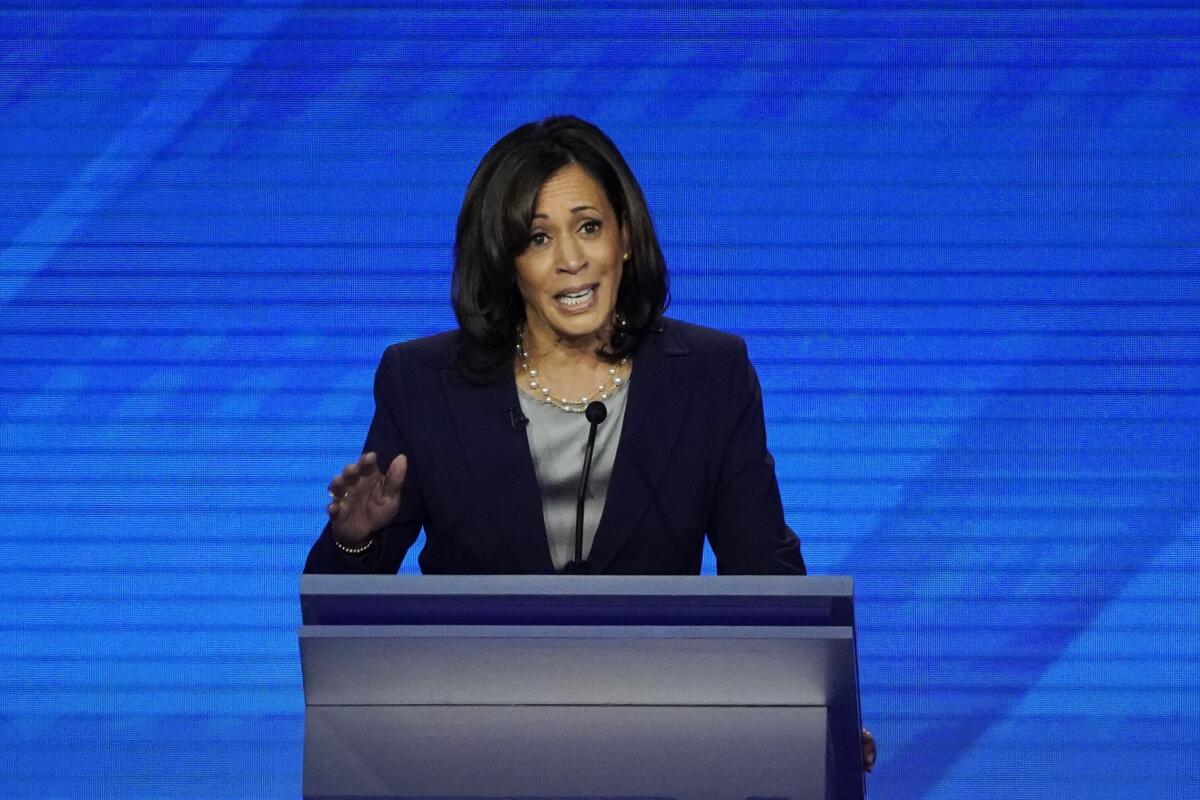
QUESTION: The candidates seem to be trying to strike a more unifying posture, while still highlighting their differences, compared to the first two debates. How well are they handling that so far? And what’s with Yang’s remark about being Asian and knowing a lot of doctors? — David Lauter
Melanie Mason: Harris’ strategy to take aim at Trump (and not at her on-stage rivals) may mean she gets less screen time, but she also got to avoid a messy intraparty food fight. It’s a risk not to get in the middle of every scuffle, since that attracts more attention, but she also doesn’t turn off viewers who dislike the candidates’ family feuding.
Seema Mehta: That is the latest in a line of jokes he cracks about his Asian heritage. Yang also contrasts himself with President Trump by calling himself an Asian man who likes math. And when he’s arguing to voters that he is the 2020 version of Bernie Sanders, he adds that he’s more Asian and tech-savvy.
Noah Bierman: It’s a real about-face from Harris, cautioning her rivals to stick to attacking Trump. We all remember how she got her big moment in the first debate by attacking Biden about forced school busing to desegregate schools. Now she is leading the charge in the other direction — focusing mostly on Trump.
- Share via
Biden, Warren and Sanders come prepared to talk health care
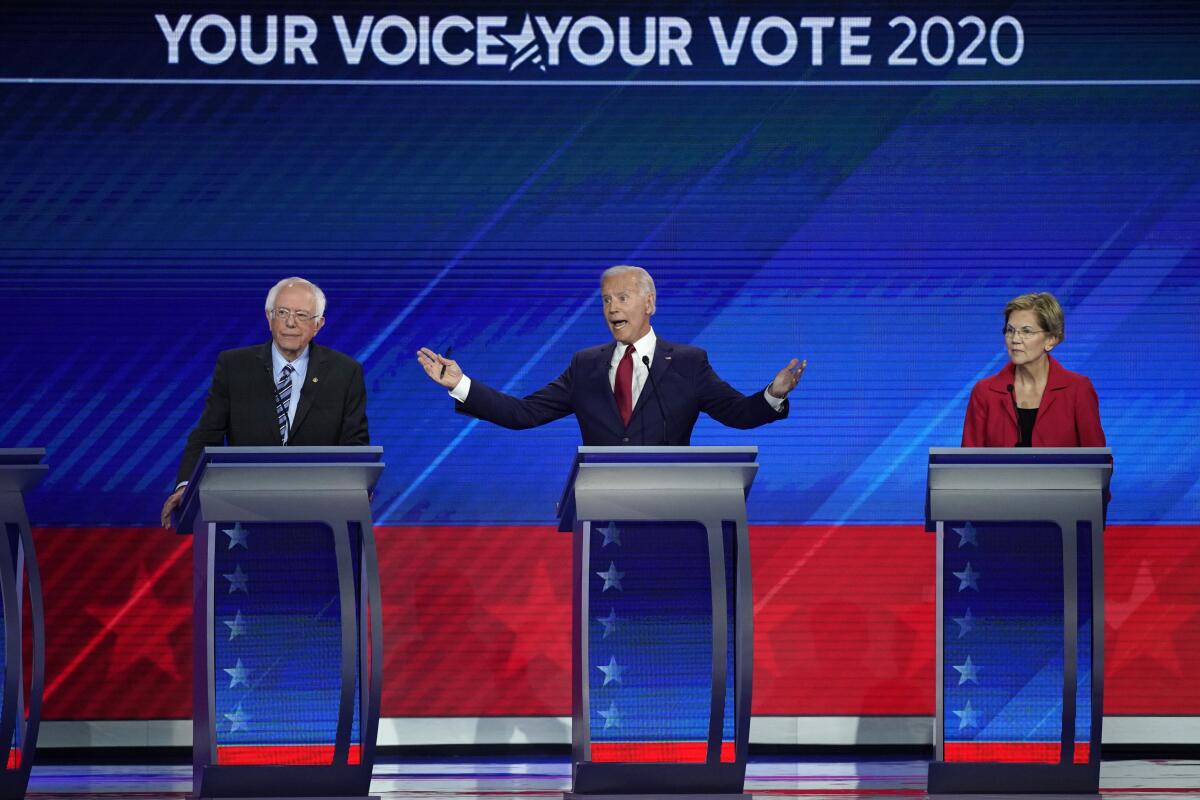
QUESTION: The top three candidates jumped directly into a debate over healthcare, and it looks like this time, former Vice President Joe Biden came prepared for the argument. Sen. Bernie Sanders, by contrast, seems to be losing his voice from the start, and it’s hard to see how he’ll keep this up for three hours. What do you think? – David Lauter
Doyle McManus: Biden came prepared, but Sens. Warren and Sanders did too. Medicare for all was a Sanders proposal, but Warren doubled down on her support for it with no equivocation. The effect was that Biden was double-teamed: facing candidates defending Medicare for all on each side.
Noah Bierman: Warren is trying really hard to avoid talking about a tax increase, instead focusing on the overall out-of-pocket cost for consumers. But she will have to take that head on if she faces Trump.
Melanie Mason: David, it’s interesting to see how Warren can reframe the narrative if she doesn’t like how the questions are framed. The moderator wanted to make Medicare for all seem like it was in opposition to Obamacare, and Warren responds with an especially tight embrace of Obama and says it would build upon Obamacare. She gets a question about taxes, and tries to reframe it about costs.
Seema Mehta: It’s interesting to watch Sen. Amy Klobuchar and Mayor Pete Buttigieg seize upon Medicare for all and directly confront Sen. Sanders as a way to highlight themselves as more pragmatic, reasonable options.
Noah Bierman: Harris, like Warren, is also making a point to praise former President Obama. They are responding implicitly to Biden, whose allies are making the case that Democrats are failing to defend a two-term popular president in their party in the name of winning over the most progressive elements.
Melanie Mason: Meanwhile, it’s clear that Sen. Harris’ strategy, both in her opening statement and in this healthcare portion, is simple: pivot to Trump.
Matt Pearce: Harris is also taking the 30,000-foot view — for all the scuffling here, every one of the Democratic candidates are miles away ideologically from President Trump, who tried to repeal the Affordable Care Act that was enacted under the Obama administration.
Seema Mehta: This is a marked change from the last debate in July, when the candidates sometimes spent more time attacking Obama-era policies that those of Trump. Afterward, members of the Obama administration spoke out strongly about the dangers of criticizing the former president, who is probably the most popular Democrat alive today.
Tyrone Beason: Candidates keep giving Obama props on healthcare. Former HUD Secretary Julián Castro just joined in. Such a change from last time.
David Lauter: As you wrote this morning, Melanie Mason and Matt Pearce, a lot of Democratic voters really don’t like watching the candidates squabble. Harris wants to take advantage of that.
Doyle McManus: A tonal note: Bernie Sanders started out hoarse. Joe Biden is running hot: making every point with passion, as if to show that his age is not an issue. Let’s see how both of them do in Hour Three.
David Lauter: Yes, that’s a good point, Doyle McManus. We’re seeing a much more forceful and focused Joe Biden than we did at the last debate, but whether he can keep it up for three hours remains to be seen.
Tyrone Beason: But the fighting among candidates continues. Castro’s taking some real swipes at Biden.
Seema Mehta: Wow, Castro just laced into Biden over his healthcare plan and perhaps made the most explicit dig at Biden’s age we have seen on any of the debate stages — repeatedly questioning whether the former vice president could remember what he said two minutes ago.
Matt Pearce: “Are you forgetting what you said two minutes ago?” Castro says, going hard after Biden. Voters who were hoping for the Democrats to unify against Trump probably won’t be happy with this debate. “This is why presidential debates are becoming unwatchable,” Buttigieg said. “Yeah, that’s called a Democratic primary,” Castro shoots back.
Tyrone Beason: “We’re on the same team here,” entrepreneur Andrew Yang says, trying to bring the candidates together. Then he makes an awkward remark about being Asian, which means he knows a lot of doctors. Odd pivot.
- Share via
What is Yang’s motivation for giving away money?
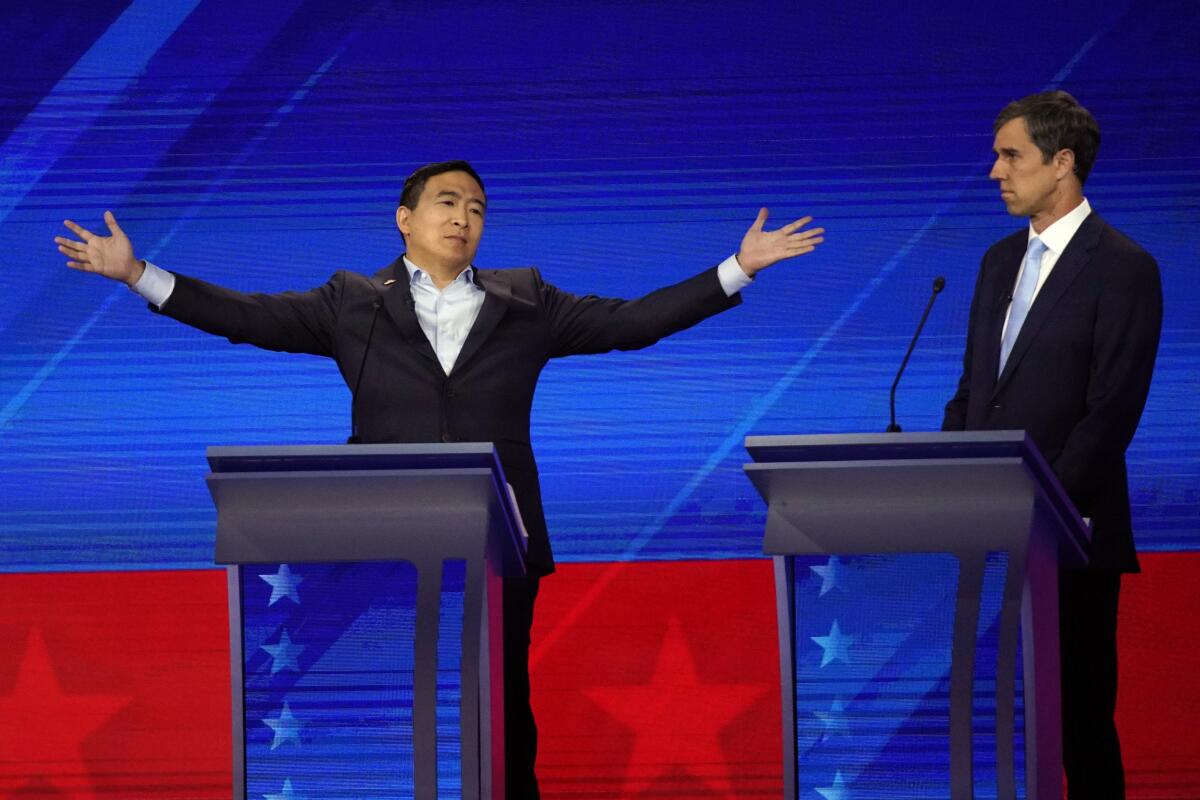
QUESTION: So, Andrew Yang’s big reveal — that his campaign will provide $1,000 per month to each of 10 families drawn by a lottery — drew some laughter from his fellow candidates on the stage. It also might draw some attention from campaign finance lawyers, since it may not be legal. What’s behind his idea? – David Lauter
Seema Mehta: The primary focus of Yang’s campaign has been creating a universal basic income to fight the impacts of automation — $1,000 per month for every American adult. His campaign has drawn a small but vocal band of supporters, and he has surpassed some of his better-known rivals in the polls. You can read more about his unusual campaign here. Yang has already been sending one New Hampshire family $1,000 per month as a demonstration of his plan. But he was paying that out of his own pocket. The new proposal Yang announced tonight would be paid for out of his campaign account, which definitely raises questions of whether it violates campaign-finance laws.
Matt Pearce: You can also see why Yang’s UBI idea has attracted some libertarians who might otherwise not be interested in a liberal Democrat: “It’s time to trust ourselves more than our politicians.” Bootstrappy.
Seema Mehta: I recently spent a couple days on the trail with Yang in New Hampshire, and I definitely ran into voters who identified as libertarian as well as voters who supported President Trump in 2016.
David Lauter: The legal question for Yang is that federal election finance rules say “using campaign funds for personal use is prohibited.” Giving money to people for their own use would seem to be “personal use.” Luckily for him, the Federal Election Commission currently lacks a quorum, so it can’t vote to enforce anything.
- Share via
What can we expect at the debate tonight?
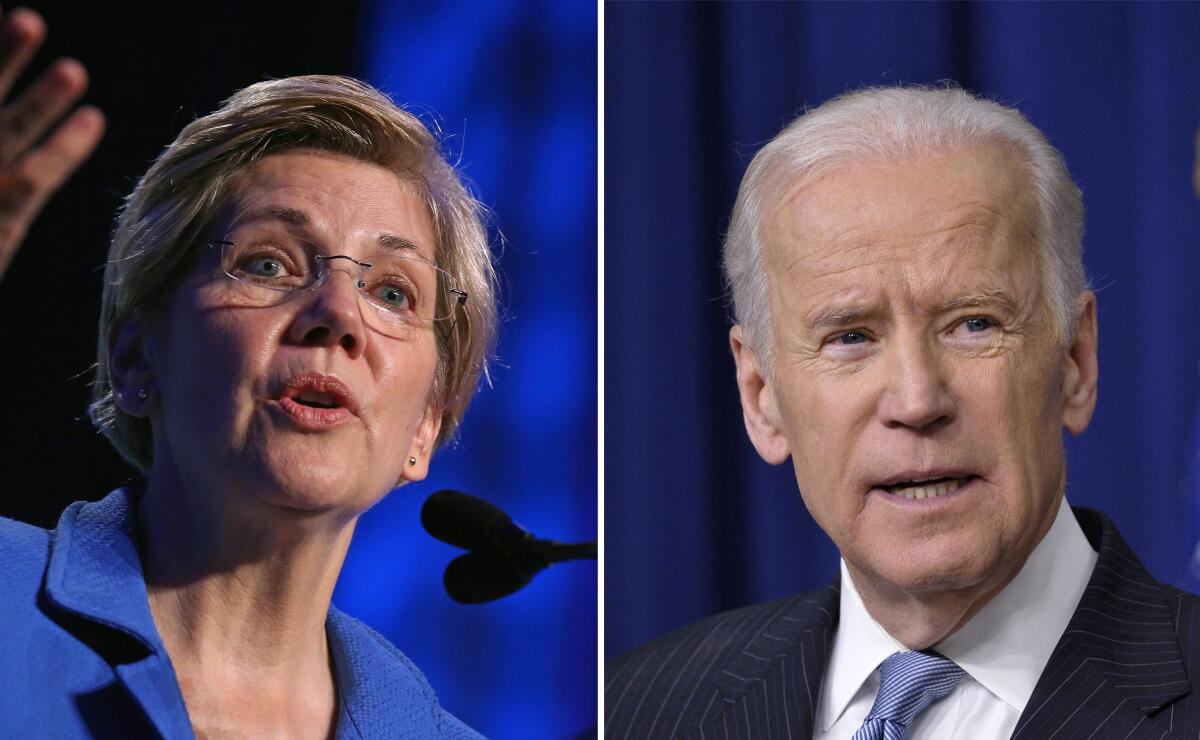
Hi, I’m David Lauter, Washington bureau chief of the Los Angeles Times. My colleague, Melanie Mason, and I will be discussing tonight’s Democratic candidate debate as it happens. We’ll be joined by several other members of The Times’ politics team, including Noah Bierman and Doyle McManus in Washington, Matt Pearce and Tyrone Beason in Los Angeles and Seema Mehta, who is with the candidates in Houston.
We hope you’ll stay with us as the debate unfolds. To get the discussion started, Melanie and I have a few questions to pose to our colleagues.
QUESTION: Let’s step back for a minute and look at the overall picture of tonight’s debate. We’ve got three candidates who form a top tier – Biden, Warren and Sanders – each with a different problem to solve, and then seven others who are all, to one extent or another, trying to hang in there in hopes that one of the top candidates stumbles.
A big question I’ll be watching involves one of those top-tier candidates: What, if anything, does Elizabeth Warren do to broaden her support? Polls have repeatedly shown her doing very well among well educated, white liberals, but not well, at all, among minorities or white voters without a college degree. What can she do or say to broaden her appeal?
How about the rest of you, what big-picture question will you be focusing on?
– David Lauter
Doyle McManus: The main event, of course, will be the faceoff between Joe Biden and Elizabeth Warren, their first face-to-face debate. Will Warren take Biden on directly? (She already does implicitly: “We can’t choose a candidate we don’t believe in because we’re scared.”) Will Biden find a way to argue that he’s more electable than Warren—without sounding as if he’s questioning whether a woman can win?
Noah Bierman: I’m interested in which issues candidates will choose to highlight. There was such an urgency around single payer health care early in the race. Now there’s a sense that some Democrats want to pull back a bit. Yet Bernie Sanders remains committed and eager to keep pushing his rivals.
Tyrone Beason: I’ll be watching to see whether the candidates will bring up Houston itself, in reference to climate change, immigration and other issues they’ve been talking about on the campaign trail. Locals are still recovering from Hurricane Harvey and the massive flooding that happened here a year and a half ago, with only a few households receiving some of the federal housing financial aid directed to the city. Immigrants make up a quarter of the local population and undocumented residents make up a big chunk of the labor force.
Specific to Elizabeth Warren, what will she say tonight to appeal to African-American voters? I was on a conference call the other day to get results of the latest Essence magazine/Black Women’s Roundtable “Power of the Sister Voter” poll and it showed Warren coming in third among the 1,064 black-women respondents overall, behind Biden and Harris. Among younger black women, though, she dropped to fourth place, with Sanders the top pick.
When I spoke to women both in both South Carolina and Michigan, two key states where black voters have great influence, they expressed genuine interest in Warren based on her emphasis on kitchen-table issues and her willingness to talk about race. But I didn’t sense that anybody was wowed by her. The most interesting part of that poll of black women is more than a quarter of survey respondents did not choose a favorite. People are still studying these candidates.
Seema Mehta: Tyrone, I spoke with a few voters a little while ago who were waiting in the hot, hot sun to get into the debate in Houston. They were all still in shopping mode, none of them had picked a candidate yet. They were split, much like the party appears to be right now, over their top priorities.
For some, beating President Trump was goal number one. But others said they wanted more, including an 18-year-old college student who said he wanted a candidate who would speak about issues that mattered to him such as gun control and college affordability, rather than just bashing the president. As the waited in line to get into Texas Southern University’s Health & PE Center, a helicopter towed a banner overheard that read, “Socialism will kill Houston’s economy! Vote Trump 2020.”
Tonight, as the debate nears, I’m wondering how the candidates are going to fare over the full three hours of the debate. That’s a long time, and I wonder if any of them will fade as the debate goes late into the evening.
David Lauter: That’s a good point, Seema. At the last debate, which also ran about three hours, several of the candidates appeared worn out by the time they got to the end. Three hours is a long time to be constantly on alert. If nothing else, we’ll get a test of their mental stamina.
- Share via
Will Trump’s invitation (and un-invitation) of Taliban leaders spur foreign policy debate?
QUESTION: Do you all think any recent news items will become fodder for debate questions? I think that the surprising news about President Trump’s invitation (and un-invitation) of Taliban leaders to Camp David would offer a chance to dive into questions about Afghanistan and foreign policy more broadly. — Melanie Mason
Noah Bierman: Melanie, that’s a very good point. Candidates often give foreign policy short shrift. But in a week when Trump fired his third national security advisor, it could serve as a proxy for the concern many Democrats voice about Trump’s stability and competence. It highlights more than any issue, the stakes of a presidential election. And even if it’s easy for Democrats to criticize Trump, many voters want to hear more about what these candidates will do on tough threshold issues: North Korea, Iran, Israel, to name a few
Tyrone Beason: Israel has obviously been a big issue. Given Prime Minister Benjamin Netanyahu’s promise to annex large parts of the West Bank “in coordination” with the U.S., maybe that’ll come up during the debate.
David Lauter: Foreign policy is an area in which Biden believes that his extensive experience gives him an advantage over his rivals. But that experience brings with it a lot of baggage, such as his early support for the Iraq war. If the topic comes up, we’ll see if any of the others believe it’s in their interest to make that an issue.
- Share via
Democratic voters fear debate attacks will weaken the nominee. So how does a candidate break out?
QUESTION: We reported that Democratic voters worry that going negative in the debates could lead to a circular firing squad, weakening the eventual nominee. What does it mean for candidates who need a breakout moment, knowing that lobbing attacks could backfire? – Melanie Mason
Noah Bierman: Melanie, I’ve been struck by the lack of volatility in this race. In recent Republican primaries, there’s been a greater sense that candidates from the lower tier would have a moment in the sun, be it Herman Cain or Newt Gingrich in 2012 or Carly Fiorina in 2016, etc. We haven’t seen as much of that this year and the window seems to be closing.
Seema Mehta: For some of the candidates who are mired in the low single-digits, they may feel like this is one of their last chances to have a moment that could go viral and have the moment in the sun Noah just mentioned. And one of the more effective ways to do that is to take on one of the front-runners.
David Lauter: Although voters say they don’t like attacks, it’s worth noting that Sen. Kamala Harris got a big bounce out of her attack on Joe Biden in the first round of debates back in June. After she took a less aggressive posture in the July debate, her support did not go up.
Matt Pearce: But even those sharp attacks have had their limits in this race. Kamala Harris got her big bump after the first debate, and it’s since deflated. Julián Castro and Tulsi Gabbard, who have also drawn attention to themselves for jabbing sharp sticks at other candidates, haven’t really seen bumps.
Noah Bierman: David, is that because Harris did not keep up the attack or because these moments are more ephemeral than we think?
David Lauter: Both things can play a role, Noah. The increases (or decreases) in support that candidates get from debates are often ephemeral. A debate isn’t the only source of information voters have about candidates, so the impact fades as voters see the candidates in other contexts. It’s also true that candidates do better when they project a consistent message from one debate to the next. If you’re on the attack in one debate, but passive in the next, that sends a mixed message.
- Share via
Will candidates at the debate go after President Trump or each other?
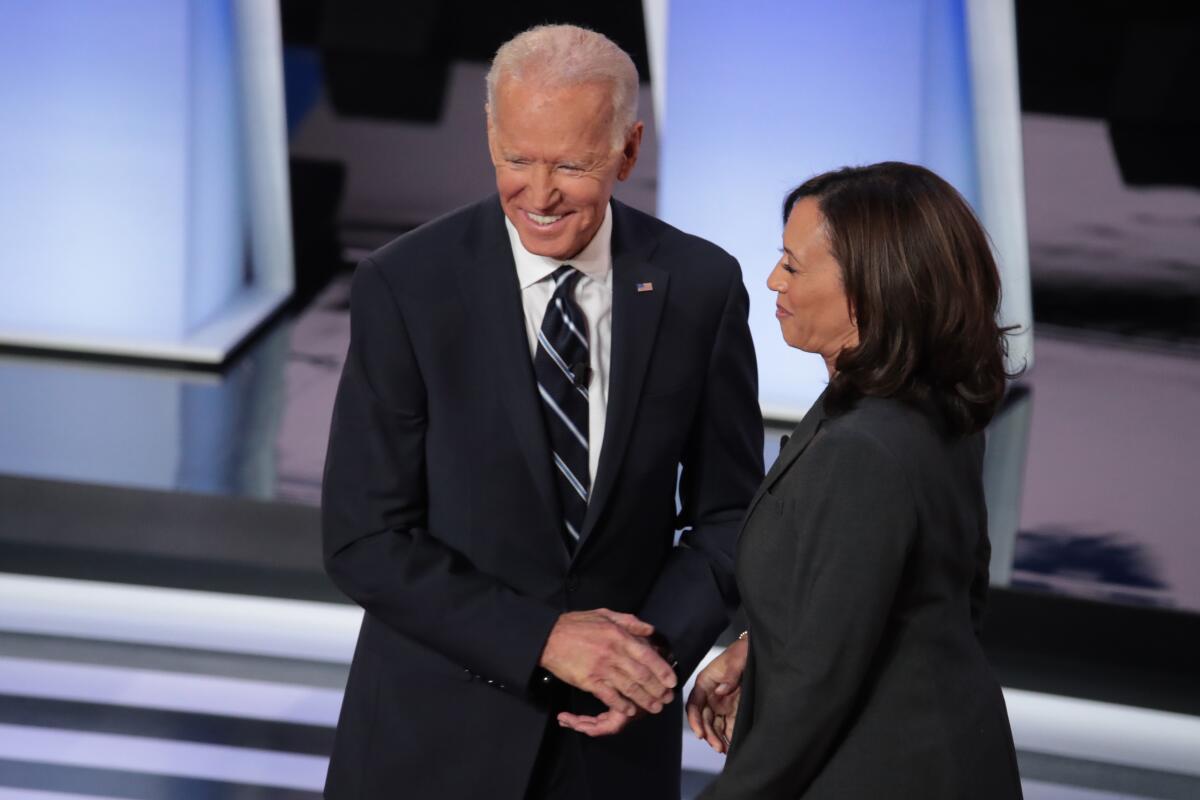
QUESTION: After the last debate, a lot of Democratic strategists grumbled that the candidates had done very little to go after President Trump, but a lot to go after fellow Democrats. Some of that is just inevitable in a primary, but I’m curious if the candidates will make an effort this time to use more of their time to build the case against the incumbent. – David Lauter
Matt Pearce: It may depend on whether the moderators will want the candidates to criticize each other. In the last debate, we saw CNN hosts egg on the candidates over healthcare policy, which is one of the big areas in this election that have yielded clear divides among the candidates.
David Lauter: Notably, Matt, our latest USC/LA Times poll shows that although healthcare is a big divide among the candidates, it’s not much of a divide among Democratic primary voters. Asked if they support “Medicare for all,” of the Bernie Sanders variety, or a Medicare option, a la Joe Biden, the largest share of Democratic voters say they’d support either one. Not much sign of a litmus test.
What to watch for when the Democratic candidates debate. Joe Biden and Elizabeth Warren will share a debate stage for the first time on Thursday in Houston.
Noah Bierman: Interesting David, that would seem to support Biden’s side, which argues that Democrats are better off in a general election with a more moderate position. Does the polling agree on that?
David Lauter: For now, it does, Noah. Right now, views of Medicare for all are polarized by party while opinions on the Medicare option are not. So Biden’s position has broader support in a general election. That could change, of course, if the issue becomes part of the election debate. Perhaps voters would end up equally polarized. For now, though, they aren’t.
Doyle McManus: Several of the lower-tier candidates are relative moderates who might move up if Biden fades: Pete Buttigieg, Amy Klobuchar, Cory Booker. If that’s their strategy, they need find a way to stand out in the eyes of moderate voters who may not have noticed them yet. One way would be to take a sharper stand against one or more progressive policies — the Sanders version of Medicare for all, for example, or decriminalizing border crossings.

